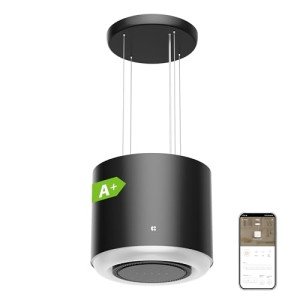A Good Rant About Island Hob
페이지 정보

본문

The Island Vent Hood: A Comprehensive Guide to Choosing and Installing the Perfect Kitchen Feature
In modern-day kitchen design, the island vent hood has actually ended up being an important centerpiece, perfectly combining functionality with visual appeal. With the rise of open-concept living spaces, where cooking areas are incorporated with dining and living areas, the value of a properly designed ventilation system has ended up being critical. This post explores what an island vent hood is, the different types available, key functions to consider, setup suggestions, and FAQs surrounding this essential kitchen element.
What is an Island Vent Hood?
An island vent hood is a kitchen extractor hood island ventilation system created to be set up above an island cooktop or range. Unlike traditional wall-mounted hoods, island hoods are suspended from the ceiling, supplying a clear view of the cooking location while effectively getting rid of smoke, steam, and odors from the kitchen. This makes island hoods an appealing option for open layouts while making sure a tidy and comfortable cooking environment.
Kinds Of Island Vent Hoods
When choosing an island vent hood, it is important to understand the various types available in the market. Here are the main categories:
| Type | Description |
|---|---|
| Ducted | Ventilation is directed outside, offering the very best air quality by expelling air and odors. |
| Ductless | Utilizes filters to clean up the air and recirculate it back into the kitchen; much easier to set up. |
| Convertible | Can operate in both ducted and ductless modes, providing versatility in setup. |
| Under-Cabinet | Installed under cabinetry; generally lower output, appropriate for smaller sized kitchen designs. |
Key Features to Consider
Choosing the ideal island vent hood includes numerous crucial elements. Here are the essential features to think about:
- Size: The hood needs to be at least as broad as the cooktop. Ideally, it ought to extend 6 inches on either side for optimum performance.
- CFM Rating: The Cubic Feet per Minute (CFM) rating indicates the hood's ventilation power. Higher CFM is needed for heavy cooking, while lower CFM might be sufficient for lighter use.
- Noise Level: Measured in sones, a lower sone score indicates a quieter operation. A quiet extractor fan for island hob is especially essential in open-concept areas.
- Lighting: Many island hoods come equipped with integrated lighting. LED lights are popular for their energy effectiveness and durability.
- Style: Island vent hoods can be found in numerous designs, including modern, conventional, and industrial. Select a hood that matches the overall kitchen aesthetic.
Setup Tips
Installing an island vent hood can be a complicated procedure. Here are some essential tips to assist in the installation:
- Check local codes and regulations to guarantee compliance with setup height and electrical requirements.
- Determine the hood's height: The top of the hood ought to be 30 to 36 inches above the cooking surface, depending upon the manufacturer's recommendations.
- Secure the mounting bracket: Ensure that the mounting bracket is appropriately anchored to the ceiling to support the weight of the hood and motors.
- Ductwork factors to consider: If using a ducted system, guarantee proper duct size and design for optimum airflow. Prevent sharp bends in ducting, which can hinder air motion.
- Electrical setup: Ensure that the electrical connections fulfill your hood's power requirements, and think about working with a certified electrician for complex setups.
Expense Considerations
The cost of an island vent hood can range significantly depending upon functions, materials, and island vent hood brand name. Below is a breakdown of prospective costs connected with getting and installing these hoods:
| Cost Element | Approximated Range |
|---|---|
| Basic Models | ₤ 300 - ₤ 600 |
| Mid-range Models | ₤ 600 - ₤ 1,200 |
| High-End Models | ₤ 1,200 - ₤ 3,000+ |
| Installation Costs | ₤ 200 - ₤ 500 |
Regularly Asked Questions
1. How often must I clean my island vent hood?Regular cleansing is encouraged, with deep cleaning at least once a month, specifically if you prepare often. 2. Can I install an island vent
cooker hood island myself?While it is possible, professional
installation is recommended for safety and optimum performance, particularly with ductwork and electrical connections. 3. Are ductless island hoods effective?Ductless hoods can efficiently filter
smoke and smells, but they might not be as powerful as ducted models. They require routine filter replacements and upkeep. 4. What type of upkeep does an island vent hood require?Regular cleansing of filters, lights, and hoods, along with looking for any wear and tear on motors or ductwork is crucial for keeping efficiency
. 5. What type of filters ought to I use?Most island vent hoods utilize aluminum or charcoal filters. Aluminum filters are multiple-use, while charcoal filters require to be replaced
regularly. The island vent hood is an essential element of a modern-day kitchen, supplying exhaustion of unwanted smells and making a striking style statement. Choosing the right type, comprehending essential
functions, and adhering to correct setup techniques will guarantee optimal efficiency and longevity of this kitchen device. Whether you are a seasoned chef or an occasional home cook, the ideal island vent hood (funny post) can drastically improve your cooking experience. By following the guidelines and factors to consider laid out in this article, property owners can make educated decisions and take pleasure in a cleaner and island vent hood more enjoyable cooking environment.
- 이전글15 Reasons Why You Shouldn't Ignore Railroad Settlement Multiple Myeloma 25.05.19
- 다음글It?s About The Watch Free Poker TV Shows, Stupid! 25.05.19
댓글목록
등록된 댓글이 없습니다.

